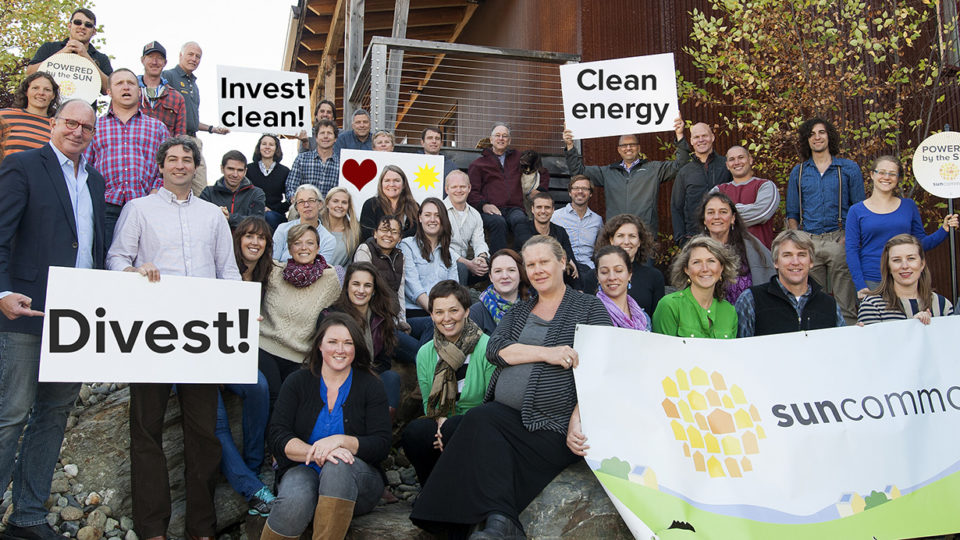SunCommon sets example for divestment
While we at SunCommon chose to divest our retirement portfolios from dirty, fossil fuel last year, it seems the state of Vermont may be catching on to the idea. According to this VTDigger article, Gov. Peter Shumlin, alongside our co-founder Duane Peterson, held a press conference at the State House yesterday urging lawmakers to divest from investments in coal and ExxonMobil. The Governor first raised the issue during his State of the State address last month as he wishes to use divestment as yet another arrow in our quiver to combat climate change. We support it!
As reported by VTDigger: The governor, alongside leaders of several coal-free businesses, maintained the state has a long history of using divestment for social change. He also argued dropping the investments not only made moral sense, but financial sense, too.
Shumlin first called for Vermont to remove its coal and Exxon interests from public pension funds in his State of the State address last month. Then, he stressed the moral imperative; on Wednesday, he added financial gain as another big motive.
At the event, Shumlin ticked off the other times Vermont has divested for social change.
In 1986, Gov. Madeleine Kunin and the Legislature called on the board to divest from companies doing business with the government of South Africa to protest their policy of apartheid.
In 1987, Treasurer Jim Douglas pushed the investment board to unload $20 million in tobacco company stocks. Douglas said he did not want to micromanage the pension fund, but that public health concerns won out.
In 2007, Vermont divested from companies doing business with the government of Sudan because of the humanitarian crisis in that country.
We chose to divest our 401k portfolio from fossil fuels. The divestment announcement last June was followed by a staff-wide educational presentation by Maeve McBride of 350VT and Dan Quinlan of Divestor.org. In keeping with our legal charter that directs the company to attend to the triple bottom line of people, planet and profit, our employees were offered mutual fund options that support clean energy.
“At SunCommon, we believe everyone has the right to a healthy environment and safer world – and clean energy is the place to start. Divesting from fossil fuels was not just a moral play, it was a financial play. I studied economics in college and see that fossil fuels represent the largest stranded asset in world history. As we re-power America’s economy with clean energy sources, fossil fuel represents a terrible investment,” said Duane Peterson, president and co-founder of SunCommon.
SunCommon automatically signs up each employee to the company’s 401k retirement plan on their first day of work, matching up to 4% of their salaries. “Those investments now will no longer fuel the planet’s carbon pollution, but will support thriving companies in the clean economy,” Peterson added.
According to a recent analysis presented at the Bloomberg New Energy Finance annual summit, global numbers show more renewable power was added each year than coal, natural gas, and oil combined. This shift is echoed throughout the American clean energy workforce.
“Today, the US solar industry employs 174,000 Americans nationwide – more than tech giants Apple, Google, Facebook and Twitter combined – and pumps nearly $18 billion a year into our economy,” said Rhone Resch of Solar Energy Industries Association.
CNN reported this week that the “number of solar jobs in the U.S. has more than doubled in five years. In fact, there are more people working in solar now than at oil rigs and in gas fields. In contrast, oil and gas firms slashed nearly 17,000 extraction jobs in 2015 as energy prices continue to plummet. Oil prices are down a stunning 70% in the last 18 months and hovering just over $30 a barrel, a 12-year low.” Ouch.
Vermont has become a proven leader in the growing green economy, but the shift is now happening on a larger scale. “A massive global transition away from fossil fuels is underway,” said Timothy Yee of Green Retirement, Inc., SunCommon’s retirement advisor, “Fossil fuel companies have four to five times more fossil fuels in existing reserves than can be safely burned meaning these inventories will become stranded assets. Investments in fossil fuel companies are, therefore, bad risks. Careful investors recognize the adverse effect that risk poses to their portfolios and act to divest from fossil fuels before a correction occurs.”
The economics are clear, but Gov. Shumlin reminded us of the moral responsibility behind divestment. As reported by VTDigger, Gov. Shumlin said in his State of the State address:
“It has been clearly documented that since the 1980s, ExxonMobil’s own scientists have long known about the dangers of global warming, and chose to conceal that from the public. At the same time that they were building their oil rigs taller to account for rising sea levels, they were funding front groups of scientists to deny climate change is real. This is a page right out of Big Tobacco, which for decades denied the health risks of their product as they were killing people.”
It’s time to put our money where our mouth is and divest from dirty, fossil fuels. Let’s invest in our clean energy future.
